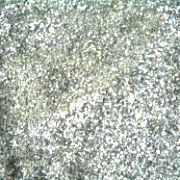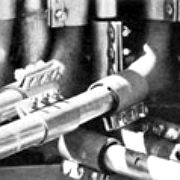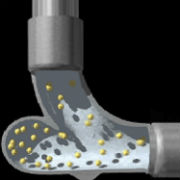Western Paving Corporation makes asphalt for its own paving operations as well as supplying material on contract for other paving companies. The Denver, Colorado plant, a division of Western Mobil, produces no less than 29 different paving product mixes.
A key component of these mixes is granite dust, collected from a rotary kiln and pneumatically conveyed to a point where it is mixed with oil and added back into the mix. This compound functions as a binding agent for the mixes, literally holding everything together.
The problem?
Granite dust is a highly abrasive material, and it was wearing through the steel long-radius sweep elbow en route to the mixer from the rotary kiln. 549
ACRO Extrusion Corporation is a Wilmington-based company that produces vinyl window systems and extrusions. PVC resin is conveyed pneumatically from the plant’s outdoor silos to the mixing room at a rate of 34,000 pounds per day. The abrasive product was causing failures in the Delaware company’s sweep elbows at an alarming frequency — as often as every two to three weeks.
Maintenance manager Al Husni knew he had to do something. Line failures were causing costly and time-consuming repairs and cleanups, and any incidents involving leaked material released to either the air or ground required documentation, subjecting the company to EPA fines. 542
As the primary wastewater treatment facility for the city of Alexandria and Fairfax County, Va., the Alexandria Sanitation Authority’s sewage plant operates around the clock — with a daily volume that can exceed 80 million gallons. For pH control, the facility uses more than 500,000 pounds of pelletized lime each month, conveyed from trucks delivering the material to 70-foot silos via a pair of four-inch lines.
A key component in the wastewater treatment process, pelletized lime is a powdery, abrasive material. The plant was plagued by leaks in the lime conveying system, its traditional long-sweep elbows rapidly wearing down from the inside out. 536
For manufacturers of abrasive materials, repair and replacement of conveying system components is a nearly constant task. And an expensive one.
Chromalloy is one such manufacturer. Its Drilling Division produces ground barite (barium sulfate) at a plant in Houston, Texas. This high-density and highly abrasive material was causing a host of problems in the conveying system. When the conventional long-sweep elbows weren’t plugging, they were prematurely wearing out. 531
PET poly pellets conveyed pneumatically from rail transport cars into holding silos — then again from storage silos into molding machines — were proving to be an expensive problem for Schmalbach-Lubeca’s Blythewood, S.C., plant. The company operates 24/7, manufacturing millions upon millions of plastic bottles each day for the beverage industry.
Similar to many manufacturing and production facilities, the Blythewood plant used conventional long-sweep elbows as part of the conveying system. The design of a conventional elbow changes the direction of conveyed material through deflection off the inner walls, causing friction and heat. 527
Even the most innocent looking material can wear down conventional long-radius sweep elbows when high volume meets high pressure. Bob DiCanio, engineering and maintenance manager at the Pet Foods Division of Quaker Oats (Rockbridge, Ill.), could practically set his watch to the timing of stainless steel elbow failures in his pneumatic conveying systems.
Every three months, almost to the day. 523
Essroc Materials Inc. is a wet-process cement plant in Frederick, Md., producing nearly 400,000 tons of cement annually using two 400-foot rotary kilns.
Dust produced during kilning of the cement must be removed from the exhaust gases — and Essroc’s kilns produced 120 tons of dust every 24 hours. While portion of this dust is sod for use in various industrial and agricultural applications, the majority must be moved pneumatically and recycled through the kilns via a process called insufflation. The rate of insufflation is controlled by the central control operator and is dictated by the chemistry of the cement being produced in the kiln.
Therein lay the problem, as they say. 519
Indiana’s Rensselaer Plastics Co. produces PVC pipe for commercial and residential plumbing with annual sales around $40 million. Resin and pellets are transferred via a pneumatic conveying system from storage hoppers to extruders.
The problem?
These same pellets and resins are abrasive, and the long-radius sweep elbows installed in the conveying system were continually being worn away by the material moving through. L.E. Koehler, assistant plant manager, was replacing worn-out elbows every two to four months in order to keep the lines running efficiently, but maintenance costs and plant downtime were steadily chewing away at profits. 516
To meet EPA air pollution standards for sulfur dioxide emissions, Montgomery County’s North Incinerator plant injects finely powdered limestone into the three incinerator units housed at the facility.
Long-radius stainless steel sweep elbows conveyed approximately 18,000 pounds of the material through the company’s dense phase pneumatic conveying system daily. The problem? Lime is incredibly abrasive and those elbows — critical components of the conveying system — were literally being worn away. 513
Four years.
That’s how long it’s been since Tom Sorensen, maintenance manager at Carbo Ceramics’ Eufaula, Ala. facility, has had to replace even a single elbow in his pneumatic conveying lines since making the switch to the Smart Elbow® deflection elbow by Hammertek. 511
February 25, 2015
Smart Elbow® deflection elbow offers solution to wood particle wear
It turns out that even ordinary wood particles can become highly abrasive when moving at a high volume and pressure.
At Northwood Pulp and Timber Ltd, in Prince George, British Columbia, wear-back sweep elbows were wearing out at an alarming rate (approximately every three months), thanks in part to the “hog fuel” mixture of bark and sawdust pneumatically conveyed through the plant’s system. 509
February 5, 2015
Smart Elbow® deflection elbow trims utility costs
A maker of oat cereal and oat flour, National Oats (a subsidiary of Curtice Burns, Inc.) uses a pneumatic conveyance system to move raw oats from their outdoor storage tanks to blending vessels housed inside the plant at a rate of 90,000 lbs/hour through an 8” pipeline. The volume of material moving through the system was taking its toll on the wear-back ceramic sweep elbows.
These sweep elbows required periodic repair and replacement — which meant stopping the line and patching worn areas of the sweeps with welded-on steel plate. When patching no longer became effective (at approximately two years after initial installation) the entire elbow and adjoining sections had to completely replaced. Maintenance teams were being called five times per year, just for elbow repair and replacement. 503
January 16, 2015
Smart Elbow® deflection elbow keeps power plant leak free
In order to meet federal sulfur dioxide emissions standards, PECO Energy Company’s Eddystone plant employs a scrubbing process using magnesium oxide (MgO) pneumatically conveyed from storage silos to a mixer before being sprayed into the plant’s exhaust stacks. The MgO must be fully operational whenever the coal-fired plant is generating electricity to keep sulfur dioxide emissions below mandated levels. Elbow failure is not an option.
500
Worn-out elbows — and the problems associated with them — are a fact of life in industrial environments. Most elbows wear out and have to be repaired and replaced frequently (sometimes as often as every 90 days in high-wear applications conveying abrasive material), costing production lines a heavy price in time, equipment and materials.
That’s what Gary Wright, Director of Plant Engineering at RheTech, always assumed to be true. Until he discovered the Smart Elbow deflection elbow from Hammertek. Pulling a year-old Smart Elbow model to check for damage, he fully expected to see considerable wear. What he found instead astounded him. 493
December 1, 2014
Hammerloy™ Series Smart Elbow® deflection elbow a perfect fit
Blowouts aren’t just costly due to lost productivity and extensive cleanup; they often carry substantial health risks and safety concerns from spilled material and environmental conditions.
This was certainly the case with the Upper Occoquan Sewage Authority (UOSA). The wastewater treatment plant handles upwards of 30 million gallons per day and provides potable water to more than 300,000 people in portions of Fairfax and Prince William counties in northern Virginia. Its chemical treatment system relies on a non-stop supply of pebble lime for raising the pH to levels where bacteria and phosphorous can be efficiently removed. 489
November 17, 2014
Smart Elbow® deflection elbow saves space, money and barley
Space is often at a premium in commercial breweries. Raw ingredients, fermentation vessels, and other brewery equipment have large footprints. Engineers and plant managers are always looking at ways to maximize efficiencies without crowding out existing equipment and personnel.
Roy Marin, staff engineer at the Miller Brewing Co. plant in Fort Worth, Texas, found himself in just such a situation. 487
November 3, 2014
Clog-free Smart Elbow® deflection elbow eliminates down time
When materials clog in pneumatic conveyor systems, manufacturers feel the pinch. Line shutdowns are costly and result in lost productivity and missed production schedules. They’re a headache too many manufacturers assumed were unavoidable. The best a manufacturer of loose, abrasive material could hope for infrequent clogs which could be cleared quickly without significantly impacting productivity.
Fiberglas Canada used to think this way, until they installed Hammertek’s Smart Elbow deflection elbow on their pneumatic conveyor system. 482
October 15, 2014
Smart Elbow® deflection elbows win the losing battles
A key ingredient in industrial and commercial flooring products, silica aggregate is incredibly abrasive. Manufacturers like Stonhard are fighting a losing battle in their pneumatic systems, replacing costly ceramic pipe elbows far too often. Their ceramic elbows, vital for moving the aggregate through the pneumatic lines, were literally being worn away by the fast moving material.
According to Greg Sosenheimer, plant manager at Stonhard’s Fort Wayne, IN, plant, 82,000 pounds of the coarse and abrasive material move through the system daily. The ceramic elbows were failing on average every three months, and the costs associated with replacement were getting out of control. 476
October 1, 2014
Putting the Smart Elbow® deflection elbow into context
One of the things we’ve always tried to demonstrate on this blog is how the Smart Elbow deflection elbow saves space, time and money.
We’ve highlighted companies dealing with plastics, abrasives, grain, wood pulp, power and wastewater through a series of case studies addressing maintenance issues, operational inefficiencies, mitigation of material costs, and flow control, to name just a few. They all had one thing in common: their conveyor systems were all improved significantly through the addition of HammerTek’s revolutionary Smart Elbow deflection elbow. They experienced less product degradation, the downtime of their production lines was significantly decreased, and productivity outputs were higher. 473
September 17, 2014
Oil Sands conference a tremendous success!
We’re back from the Oil Sands Trade Show and Conference! Two wonderful days of learning and networking with visionaries and leaders from the oil sands industry. The HammerTek team was on the expo floor showcasing the Smart Elbow® deflection elbow, networking with other suppliers and vendors from both the United States and Canada and, most importantly, learning about some of the critical issues facing this industry in the coming years.
465






